Everyday Australians step up as relentless wildfires push country to the brink
Category: Travel, Geography and Foreign Cultures
Via: perrie-halpern • 5 years ago • 4 commentsBy: Stephen Easton
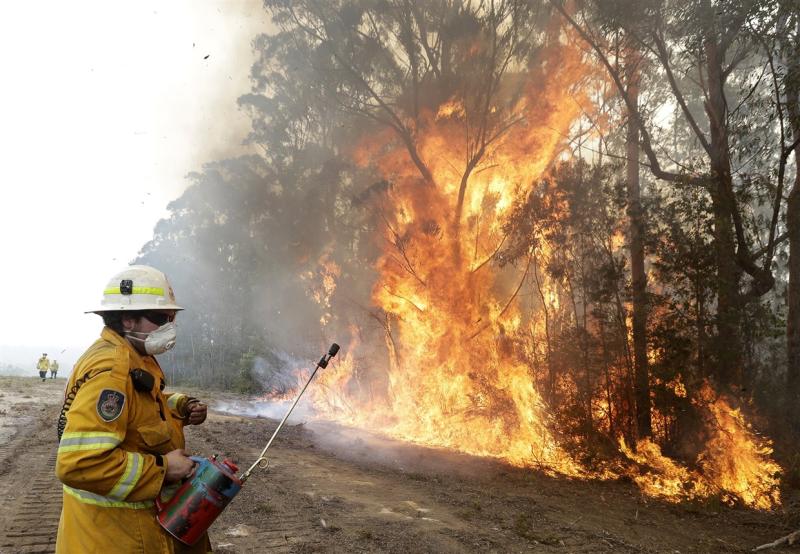


CANBERRA, Australia — Hayley Boland was on her couch in the town of Queanbeyan when the severity of Australia's wildfires began to hit close to home.
Boland, who is in her mid 20s and works at a plumbing company, said she was at home, “feeling pretty useless" when she saw the emergency on the south coast unfold on Snapchat.
"And then I also found out that one of my childhood friends lost her family home, and those people were like family to me," she said. "They are just amazing people and, it's just, it's totally gone. They have nothing, and for them to have lost all of that, it's really, really sad."
A day later, she decided to launch an impromptu barbecue to raise funds for people who were suddenly left homeless. And to her surprise, it became a sizable event, supported by a Facebook group that grew to more than 500 members overnight.
“It just turned into a full-blown operation,” Boland said.
Amid the horrors of the country’s worst bushfires ever, and amid disputes over their cause and fear of what is yet to come, Australians have organized a series of grassroots disaster-relief networks — many through social media — offering a wide range of help to thousands of people who were displaced in recent weeks.
Boland said she met lots of people who were shocked at the speed and ferocity of the fires, which leapt down from the hinterland upon coastal towns overnight, much faster than anyone expected. Some families have been evacuated multiple times.
"That’s the scary part about it,” she said. “There are so many communities and so many people that have literally just lost everything.”
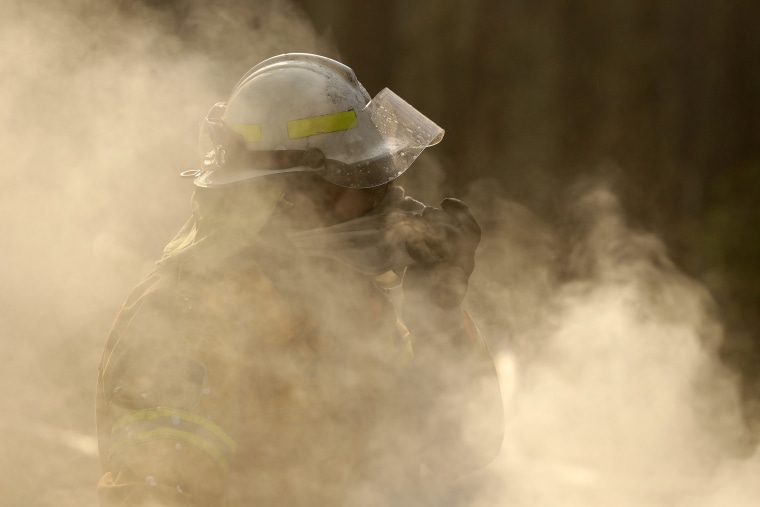 A firefighter covers his face from black smoke as he battles a wildfire near Bendalong, Australia on Jan. 3, 2020. Rick Rycroft / AP
A firefighter covers his face from black smoke as he battles a wildfire near Bendalong, Australia on Jan. 3, 2020. Rick Rycroft / AP Doctors, pharmacists, nurses and other health care professionals have also linked up in fire-affected areas, working together to assess and meet considerable challenges, both immediate and longer-term. Several coastal doctors have complained about being shut out of disaster management . Power outages left hospitals, clinics and chemists running on petrol generators. Official advice not to drink tap water has now been lifted in large swaths of the coast, but electricity is still out in many areas and full recovery will take a long time .
Australians, however, have banded together to try to help where emergency services have fallen short. Some have rallied around members of local Aboriginal communities on the south coast of New South Wales and many other fire-affected parts of the country, concerned that some may be left out of the loop on emergency warnings or relief efforts.
Two new websites have sprung up to connect displaced Australians with people offering temporary accommodation. Daniel Ferguson of Snake Valley, Victoria, launched Helping Homes on Jan. 3. Around the same time, Sydney writer Erin Riley started Find a Bed , spreading the word through her 10,000 Twitter followers.
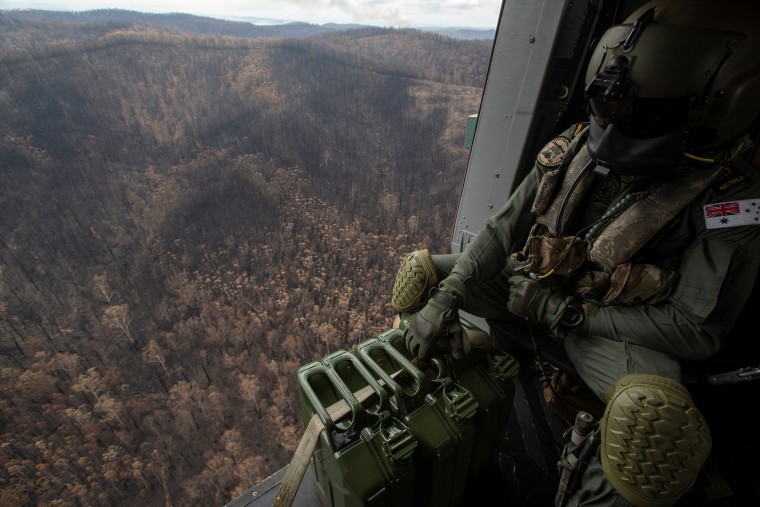 A Royal Australian Navy aircrewman flies over the burnt countryside of New South Wales, Australia, inside an MRH-90 helicopter during Operation Bushfire Assist 2020, on Jan. 8, 2020. ABIS Thomas Sawtell / Australian DOD via Reuters
A Royal Australian Navy aircrewman flies over the burnt countryside of New South Wales, Australia, inside an MRH-90 helicopter during Operation Bushfire Assist 2020, on Jan. 8, 2020. ABIS Thomas Sawtell / Australian DOD via Reuters Boland’s project was boosted thanks to existing communities around Queanbeyan and Canberra that tapped their own networks. With help from a couple friends, Boland's Faecbook group, which she initially set up for a one-off barbecue, grew quickly. People from the Sikh community cooked large amounts of curry and rice to feed people, she said.
Allison Elliott from Canberra, the nation’s capital, and nine other people are using Facebook to coordinate community help. Their modest city saw an influx of evacuees from nearby rural and coastal regions soon after hot westerlies sent walls of flame into a string of towns and villages around New Year's Eve.
Eight people have died and more than 450 homes were razed in the Eurobodalla and Bega regions alone. Those communities sit south of Sydney and east of Canberra.
Australian Prime Minister Scott Morrison was criticized for leaving for a family vacation in Hawaii last month as fires were underway. In an interview with the Australian Broadcasting Corporation that aired Sunday he said, "There are things that I could have handled on the ground much better."
The leader said he will propose a national review into the government's response to the blazes that have so far killed 28 across the country.
Australians were told to leave the coast as soon as they could, but intermittent road closures, fuel shortages and traffic jams made travel difficult. With electricity cut off and cellular networks patchy at best, only emergency radio broadcasts remained.
One family who made it through but couldn't find a hotel turned to a general Canberra community Facebook group. Elliottt saw their post and a string of accommodation offers.
"It just sort of clicked with me that, well, this is the beginning,” she said. “This flood of people are coming to Canberra, and where are they going to go?"
Elliott’s started a group just to link evacuees with community accommodation. A week later, it had over 9,000 members and she had about 10 other trusted moderators, including one in Canada who handles the graveyard shift.
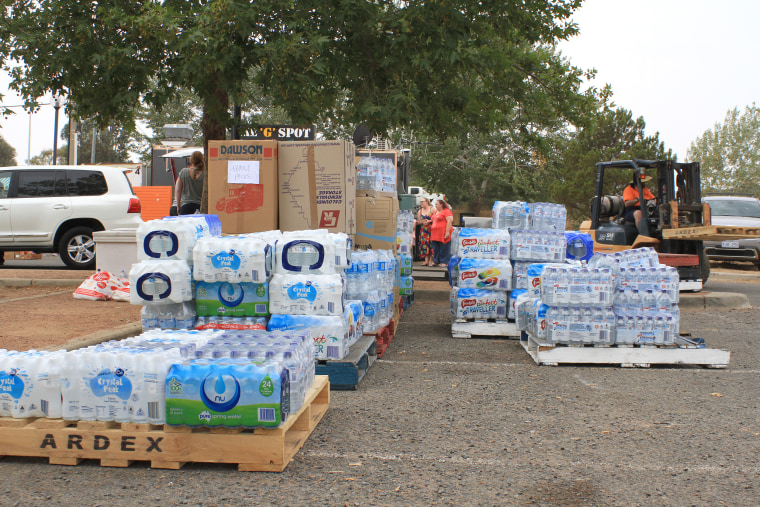 Water to be loaded at one of the drop-offs organized by Andrew Dale. Stephen Easton
Water to be loaded at one of the drop-offs organized by Andrew Dale. Stephen Easton "In the first few days I was getting to sleep at 1, 2 in the morning, because the traffic on the page was just so, so full-on," she said. "And there was a lot of us doing that."
Elliottt finds most requests are filled within 15 to 20 minutes. She says Canberrans have responded to needs with “phenomenal” speed.
Community efforts have also organized around helping Australia’s firefighters, who have been stretched thin battling the blazes. One Facebook group, #SlabsforHeroes , focused on running water and supplies to firefighters using a local business as a drop-off point.
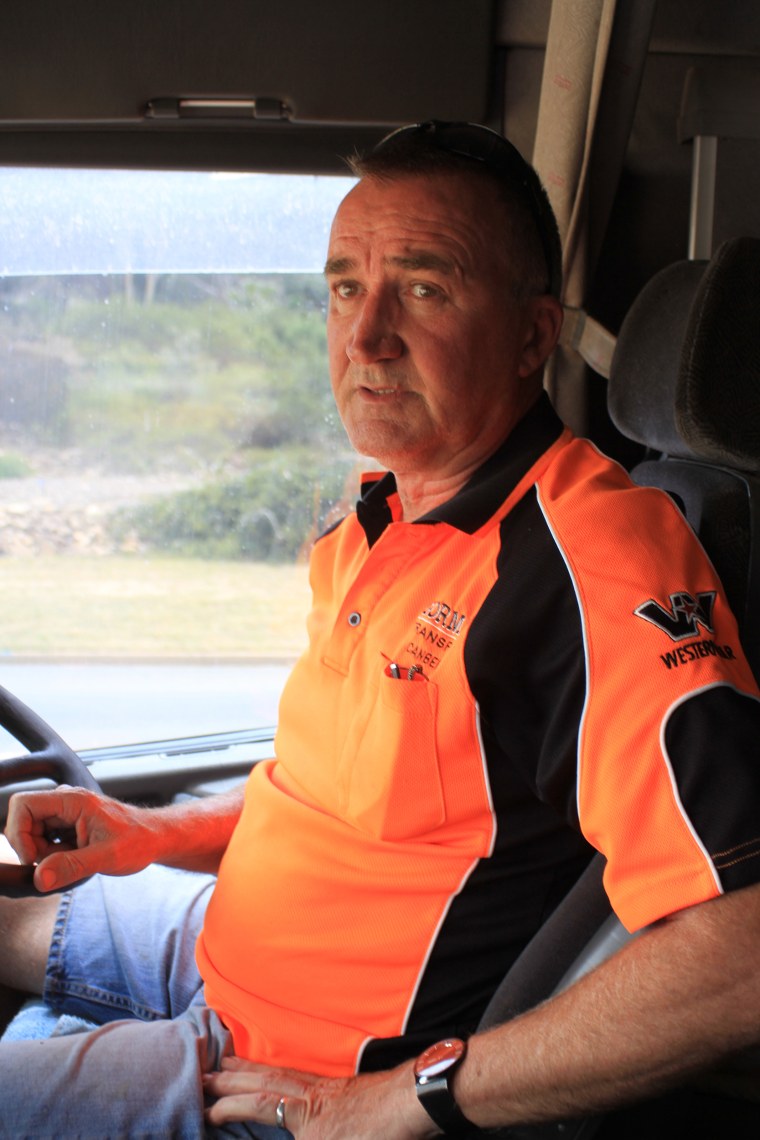 Driver Robert "Cowboy" Gorman waits for donated water to be loaded onto his vehicle. Stephen Easton
Driver Robert "Cowboy" Gorman waits for donated water to be loaded onto his vehicle. Stephen Easton Others are driving through hazardous conditions to transport goods. Truck driver Robert "Cowboy" Gorman has worked with Andrew Dale, who owns a catering business based around a food van that’s well known in Canberra.
Dale has set up a series of drop-offs to help get supplies into dangerous areas. They coordinated with the Rural Fires Service (RFS) to get through roadblocks.
"We were one of the first convoys to go down," Gorman said of his runs to bring supplies to firefighters. "I had an RFS guy with me, so I learned a lot about fires, and he learned a lot about trucks."
Gorman said they drove for several hours past trees that threatened to fall, smoldering bush, blackened fields and the remains of towns and villages. At the coastal town of Moruya, they could go no farther.
"It just rips your heart out,” he says. “But we got through all right."



I get regular updates from my family in Australia. A number of them are in Orange NSW which is around 160 miles SW of Sydney. The air quality is horrible the kids wear masks if they have to leave the house. They got a bit of rain a few days ago but nothing that would stop the massive fires.
As stated in this article many of our Australian friends are banding together to help when and where ever they can.
American has around 100 fire fighters now in Aussie including 7 Native American wild fire fighters. From my understading more are on the way.
The temps in Australia are breaking all records. On January 4th, 2020 the temp is a the Sydney suburbs hit 120 degrees F...The average daily high temp in January is 81 degree and the record was 110 degrees.
Many of the reservoirs are a very dangerously low levels with a drought that is in it's 4 year there is little rain in the near future.
Dear Brother Kavika: Often the worst of circumstances brings out the best in us.
The trick is to bring out our better sides when there is no crisis.
In any event. this is good to hear.
Folks coming together for the good of all.
P&AB.
E.